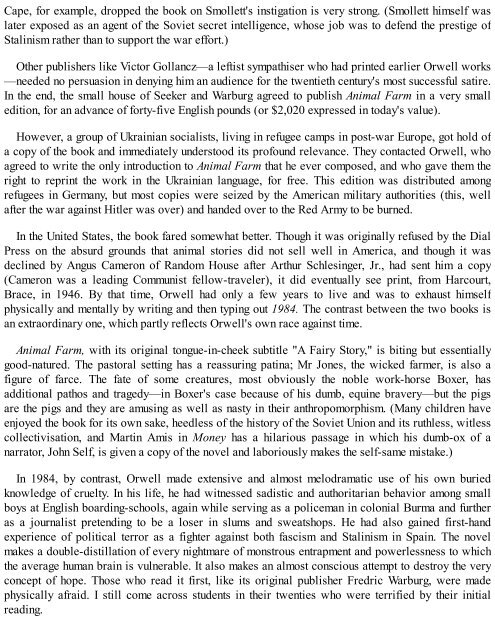Create successful ePaper yourself
Turn your PDF publications into a flip-book with our unique Google optimized e-Paper software.
Cape, for example, dropped the book on Smollett's instigation is very strong. (Smollett himself was<br />
later exposed as an agent of the Soviet secret intelligence, whose job was to defend the prestige of<br />
Stalinism rather than to support the war effort.)<br />
Other publishers like Victor Gollancz—a leftist sympathiser who had printed earlier Orwell works<br />
—needed no persuasion in denying him an audience for the twentieth century's most successful satire.<br />
In the end, the small house of Seeker and Warburg agreed to publish Animal Farm in a very small<br />
edition, for an advance of forty-five English pounds (or $2,020 expressed in today's value).<br />
However, a group of Ukrainian socialists, living in refugee camps in post-war Europe, got hold of<br />
a copy of the book and immediately understood its profound relevance. They contacted Orwell, who<br />
agreed to write the only introduction to Animal Farm that he ever composed, and who gave them the<br />
right to reprint the work in the Ukrainian language, for free. This edition was distributed among<br />
refugees in Germany, but most copies were seized by the American military authorities (this, well<br />
after the war against Hitler was over) and handed over to the Red Army to be burned.<br />
In the United States, the book fared somewhat better. Though it was originally refused by the Dial<br />
Press on the absurd grounds that animal stories did not sell well in America, and though it was<br />
declined by Angus Cameron of Random House after Arthur Schlesinger, Jr., had sent him a copy<br />
(Cameron was a leading Communist fellow-traveler), it did eventually see print, from Harcourt,<br />
Brace, in 1946. By that time, Orwell had only a few years to live and was to exhaust himself<br />
physically and mentally by writing and then typing out 1984. The contrast between the two books is<br />
an extraordinary one, which partly reflects Orwell's own race against time.<br />
Animal Farm, with its original tongue-in-cheek subtitle "A Fairy Story," is biting but essentially<br />
good-natured. The pastoral setting has a reassuring patina; Mr Jones, the wicked farmer, is also a<br />
figure of farce. The fate of some creatures, most obviously the noble work-horse Boxer, has<br />
additional pathos and tragedy—in Boxer's case because of his dumb, equine bravery—but the pigs<br />
are the pigs and they are amusing as well as nasty in their anthropomorphism. (Many children have<br />
enjoyed the book for its own sake, heedless of the history of the Soviet Union and its ruthless, witless<br />
collectivisation, and Martin Amis in Money has a hilarious passage in which his dumb-ox of a<br />
narrator, John Self, is given a copy of the novel and laboriously makes the self-same mistake.)<br />
In 1984, by contrast, Orwell made extensive and almost melodramatic use of his own buried<br />
knowledge of cruelty. In his life, he had witnessed sadistic and authoritarian behavior among small<br />
boys at English boarding-schools, again while serving as a policeman in colonial Burma and further<br />
as a journalist pretending to be a loser in slums and sweatshops. He had also gained first-hand<br />
experience of political terror as a fighter against both fascism and Stalinism in Spain. The novel<br />
makes a double-distillation of every nightmare of monstrous entrapment and powerlessness to which<br />
the average human brain is vulnerable. It also makes an almost conscious attempt to destroy the very<br />
concept of hope. Those who read it first, like its original publisher Fredric Warburg, were made<br />
physically afraid. I still come across students in their twenties who were terrified by their initial<br />
reading.









![Genki - An Integrated Course in Elementary Japanese II [Second Edition] (2011), WITH PDF BOOKMARKS!](https://img.yumpu.com/58322134/1/180x260/genki-an-integrated-course-in-elementary-japanese-ii-second-edition-2011-with-pdf-bookmarks.jpg?quality=85)
![Genki - An Integrated Course in Elementary Japanese I [Second Edition] (2011), WITH PDF BOOKMARKS!](https://img.yumpu.com/58322120/1/182x260/genki-an-integrated-course-in-elementary-japanese-i-second-edition-2011-with-pdf-bookmarks.jpg?quality=85)





